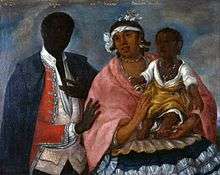Sambo (racial term)
Sambo (sometimes zambo) is a derogatory term used for a person with Indigenous American origin and, in some countries, also mixed with African origin. In an 18th-century Mexican casta painting by Ignacio Maria Barreda, zambo is a synonym for lobo (Spanish for 'wolf').

Later, its technical meaning was expanded to include people having a mixture of black and white ancestry—mulatto, quadroon, octoroon, etc. in modern US English[1] and British English.[2]
Etymology
The word sambo came into the English language from the Latin American Spanish word zambo, the Spanish word in Latin America for a person of mixed African and Native American descent.[3] This in turn may have come from one of three African language sources. Webster's Third International Dictionary holds that it may have come from the Kongo word nzambu ('monkey')—the z of (Latin-American) Spanish being pronounced here like the English s. The Royal Spanish Academy gives the origin from a Latin word, possibly the adjective valgus[4] or another modern Spanish term (patizambo), both of which translate to 'bow-legged'.[5]
The equivalent term in Portuguese-speaking areas, such as Brazil, is cafuzo.
Literature
Examples of Sambo as a common name can be found as far back as the 19th century. In Vanity Fair (serialised from 1847) by William M. Thackeray, the black-skinned Indian servant of the Sedley family from Chapter One is called Sambo. Similarly, in Uncle Tom's Cabin (1852) by Harriet Beecher Stowe, one of Simon Legree's overseers is named Sambo. Instances of it being used as a stereotypical name for African Americans can be found as early as the Civil War.
The name Sambo became especially associated with the children's book The Story of Little Black Sambo by Helen Bannerman, published in 1899. It was the story of an Indian boy named "Sambo" who outwitted a group of hungry tigers. Bannerman also wrote Little Black Mingo, Little Black Quasha, and Little White Squibba. In this book, Sambo is the name of a southern Indian boy.
Places
Sambo's Grave
Sambo's Grave is the 1736 burial site of a young Indian cabin boy or slave, on unconsecrated ground in a field near the small village of Sunderland Point, near Heysham and Overton, Lancashire, England. Sunderland Point used to be a port, serving cotton, sugar and slave ships from the West Indies and North America.
Sambo's restaurant chain
The once-popular Sambo's restaurant chain used the Helen Bannerman images to promote and decorate their restaurants, although the restaurants were originally claimed to have been named after the chain's co-owners, Samuel Battistone and Newell Bohnett, in an attempt to mask the racism. The name choice was a contributing factor in the chain's demise in the early 1980s.[6]
References
- "Definition of "Sambo" (US English)". Oxford Dictionaries Online. Retrieved 24 December 2015.
- "Definition of 'Sambo' (British and World English)". Oxford Dictionaries Online. Retrieved 24 December 2015.
- Forbes, Jack. 1993. Africans and Native Americans: The Language of Race and the Evolution of Red-Black Peoples. University of Illinois Press. p. 235.
- Collins Latin Concise Dictionary. UK: HarperCollins Publishers. 1997. ISBN 978-0-06-053690-9. English-Latin section, p. 20.
- "patizambo" (translation). Password Spanish–English Dictionary. Cambridge University Press. 2014.
- Molina, Joshua. 4 June 2020. "BizHawk: Sambo’s Owners Heed Protesters’ Call to Change Name of Santa Barbara Restaurant." Noozhawk.
Bibliography
- Boskin, Joseph (1986) Sambo, New York: Oxford University Press
- Goings, Kenneth (1994) Mammy and Uncle Mose: Black Collectibles and American Stereotyping, Bloomington: Indiana University Press, ISBN 0-253-32592-7
External links
- e-texts of The Story of Little Black Sambo: